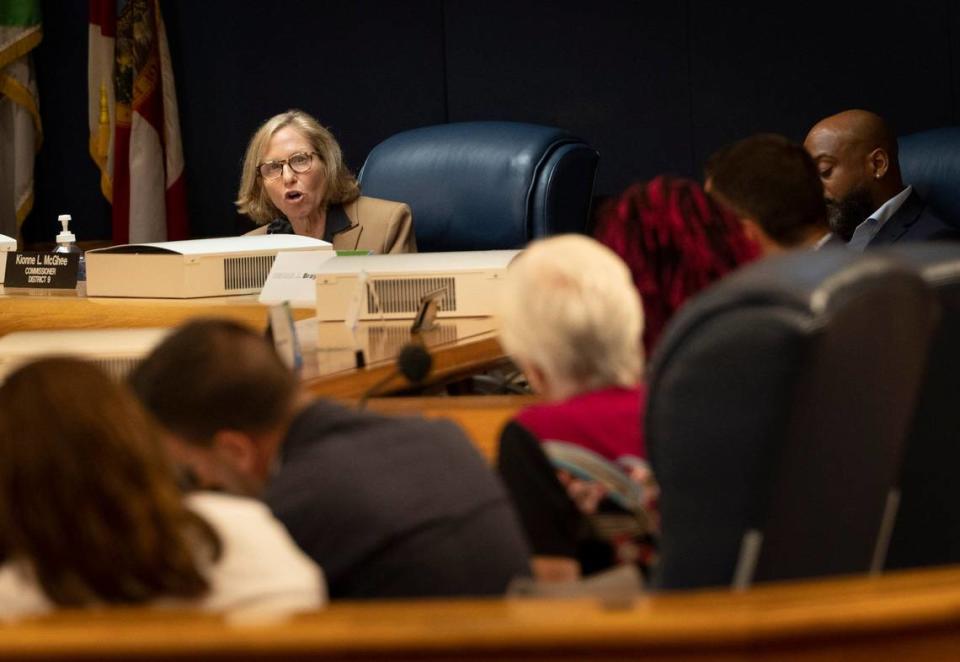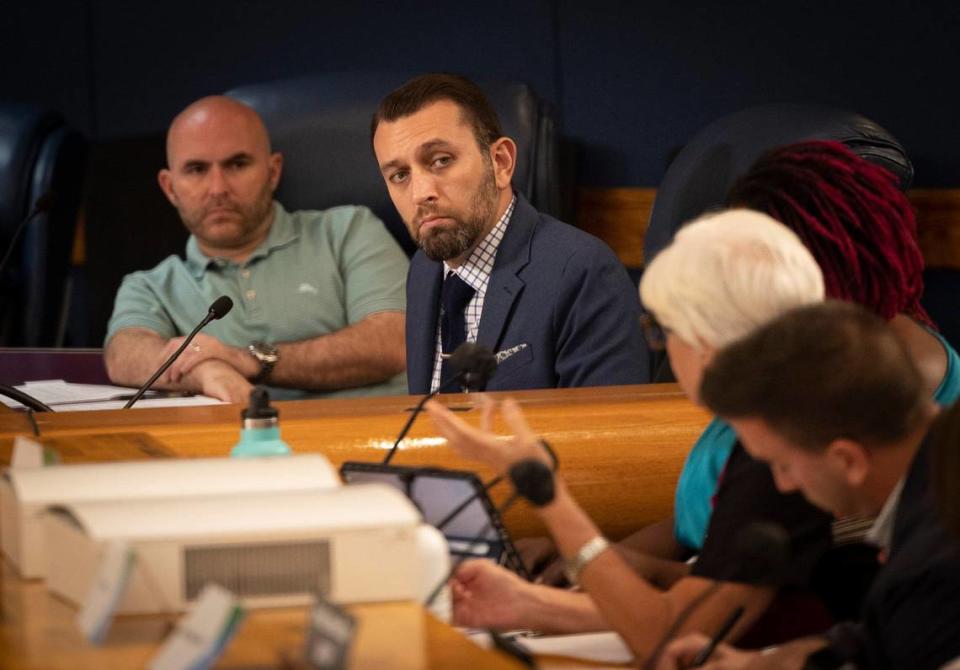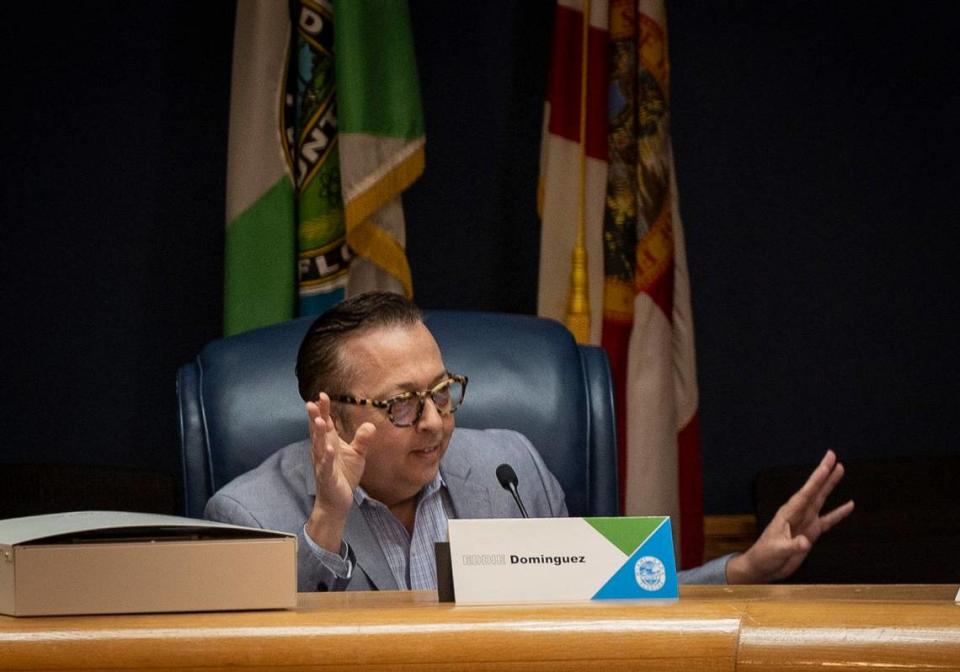Panel was supposed to review Miami-Dade police abuse. Three years in, it hasn’t happened
More than three years and millions of dollars after a battle was waged and won to resurrect a civilian oversight board for Miami-Dade County police, it’s managed to take up exactly one largely inconsequential case
The Independent Civilian Panel — long a major goal for police reform activists — remains mired in problems. Quorums have been hard to come by at meetings. Its ability to review cases has been handcuffed, with the police department demanding hundreds of thousands of dollars for records and also arguing the panel’s legal authority is limited. And now a looming political campaign for the county’s first elected sheriff puts its future in question.
“It’s taken so long to get up and running that the excitement of when we first started this has faded,” said Susan Khoury, a local activist who was on the front lines during the fight to create the panel and who has parlayed that into a run for sheriff. “Now the MDPD [Miami-Dade Police Department] is playing games with them and I think it’s outrageous. It actually shows why having an ICP is so important.”
Only six people were in the audience of the cavernous commission chamber during the panel’s most recent meeting. Almost half of what is supposed to be a 13-member panel were absent — or had yet to be appointed. None of the reports listed for discussion from the panel’s six committees were taken up because those groups had not yet met or the committee chairs were absent.
The evening’s only speaker was Jeanne Baker, a long-time community activist who was also instrumental in the panel’s creation.
“There’s really been a chronic problem of not enough of you showing up to really get your work done,” said Baker. “I want to just start by sharing and perhaps reminding some people that I was part of a very large coalition of community organizations — I think in the end there were 37 community organizations — that really wanted the ICP to come into existence, for there to be genuine reasonable effective oversight of police in this county.”

The ICP is currently struggling with several issues: A conflicting interpretation of its ordinance, panel appointments that have yet to be made, thwarted reviews of police actions by the agency, even its very future.
In July, ICP Executive Director Ursula Price requested all complaints filed against Miami-Dade Police. The department’s response: The ordinance only requires MDPD to turn over about 5 percent of those records, the remainder must be redacted, which could take up to two years and cost in excess of $400,000. Without those records, Price said, it’s near impossible to determine trends in everything from excessive use of force to patrol car crashes.
Also in July, Miami-Dade Police Director Alfredo “Freddy” Ramirez shot himself in the head on the roadside near Tampa after an argument with his wife. Publicly supportive of the ICP, Ramirez, the favored candidate to become the county’s first sheriff in six decades, dropped from the race as he recovers. Though it won’t directly affect budgeting, it leaves the police department’s future co-operation with the ICP up to whoever is elected sheriff in November 2024.
That means the panel’s very survival could — once again — come down to public pressure and political will.
“The sheriff can’t dissolve us. The question is whether the sheriff will agree to allow us to conduct oversight of the department,” ICP Chairwoman Loreal Arscott said last week during an interview with the Miami Herald. “I’m not concerned that the support is not there. We still have the support of the mayor’s office. I’m going to stay hopeful for now.”

Still, it’s also clear the next sheriff will likely get a mouthful from the leader of one of the largest and most influential voting blocks in South Florida. The president of the South Florida Police Benevolent Association says the ICP is just another layer of unnecessary oversight.
“I just don’t think it’s [the ICP’s existance] needed,” said union president Steadman Stahl, who represents 7,000 first responders throughout Miami-Dade County. “I don’t believe you should have people reviewing what the job entails, when they don’t even know what the job involves.”
GEORGE FLOYD’S DEATH
The video of George Floyd’s excruciating death under the foot of Minneapolis Police Officer Derek Chauvin on May 25, 2020, made international headlines and sparked the largest social uprising across cities in U.S. history. Marches in New York, Los Angeles, Chicago and Atlanta forced the closing of highways, shut down business and made simple commutes all but impossible.
Miami was no exception and Miami-Dade Commissioner Barbara Jordan noticed. Jordan had fought for the creation of a police oversight panel for the better part of a decade. And through the marchers’ calls for police accountability and reform, she saw an opening. So the commissioner went to work on re-establishing an oversight panel that had shuttered more than a decade earlier because of budget cuts during a worldwide financial crisis. Jordan did not respond to multiple efforts for comment about the ICP’s lack of progress.
The issue of a review panel was so contentious that the first two attempts to send it to voters in 2020 were killed. Mayor Carlos Gimenez vetoed a commission vote for a referendum. A few weeks later, commissioners couldn’t find enough votes to let the public vote on it. Still, Jordan persisted.
And by the end of August, after some concessions — like being granted subpoena power but not the ability to punish —she had Gimenez’s support to let commissioners vote once again on re-establishing the panel. This time, it passed eight to five.
PROBLEMS FROM THE GET-GO
There were problems from the start. Not only was the panel created during tumultuous social uprisings, it was also born at the height of the deadliest pandemic the world had seen in a century. Also, several commissioners facing elections chose to withhold their appointments. And without an executive director to take charge, the panel had not even secured office space.

The panel was set back further when its first choice for executive director, after a lengthy search, backed out just days before she was to take the helm. It had no website. Getting paper and pens was difficult, according to Arscott. Panel members had to undergo training in everything from ethics to police operations. Subpoena power is virtually useless without the list of complaints and investigations that Price is seeking.
“We didn’t have an executive director and we didn’t have people with institutional knowledge,” said Arscott. “We didn’t anticipate some of the barriers and obstacles.”
The ICP’s first meeting was in October 2021. But meetings over the next year were sporadic, often lacking a quorum. No cases were taken up. Arscott was limited to trying to sell police oversight to smaller municipalities with their own law enforcement agencies and meeting with concerned citizens throughout Miami-Dade. Only Miami, Miami-Dade and North Miami have civilian oversight boards.
Price — whose name is well known in law enforcement reform circles — was finally hired late last year. A community activist with contacts stretching to Washington D.C., she is credited with helping turn around the troubled New Orleans police department after Hurricane Katrina.
Finally last May, the panel heard its first case. It involved a former Miami police officer who felt he was mistreated by police at an Enterprise Rental Car counter after getting into an argument with an agent. When Price requested information on his case, she also asked for all complaints filed with MDPD.
The response came in August in a two-page letter signed by Interim Director Stephanie Daniels. It said that according to the ordinance that created the ICP, MDPD was only required to pass along files closed by internal affairs — a drastically smaller percentage than all the complaints filed.
“The PCB [Professional Compliance Bureau, or internal affairs] will generate a cost estimate based on the extent and amount of redactions required and, once payment is received, the records will be provided in the normal course of business,” Daniels wrote.
There was no estimate of the cost in the police department’s response. Price said she met with staff who told her getting the records she requested could take up to two years and cost $400,000. Her goal now, she said, was to work out some type of arrangement in which police share databases with ICP.
In the one case the ICP actually reviewed, involving the complaint from the retired Miami police officer, no definitive decision was reached and it wound up requiring “further review.”
Despite the setback, Price remains convinced the panel will work out some type of agreement with Miami-Dade Police.
“It’s just an attempt to understand police practices,” she said. “It’s not looking for a needle in the haystack. It’s to ensure we can assist the police department in best practices to serve the community.”
A NEW SHERIFF IN TOWN
The elephant in the room remains the upcoming sheriff’s race. A statewide referendum mandated that Miami-Dade join the state’s 66 other counties and hold an election for sheriff for the first time almost 60 years. It will take place in November 2024.
And though the ICP’s $1 million budget isn’t covered by the police department, it leaves future co-operation with the panel completely up to whoever is elected next year. Ramirez, favored to win the election before the shooting, was publicly supportive of the panel. When he exited the race, new candidates jumped in. As of the first week of October nine Republicans and three Democrats had thrown their hat into the contest. Stahl, the union president, said he expects the final tally to be about 20.
Two of the biggest names who said they will run, both said they welcome police oversight and have no plan to block the panel from doing its job.
“If we want the trust of the community, then the community must be part of the police department,” said Florida Highway Patrol trooper Joe Sanchez, a former Miami Commission Chairman who said he will announce his candidacy soon.
The same tone was struck by former long-time South Florida Police Benevolent Association President John Rivera.
“I don’t mind people looking into and scrutinizing,” Rivera said. “It is what it is. Be up front. Be open.”
Not all the candidates responses were requested and some didn’t respond to requests. Still, no one knows what the future holds for the civilian oversight board.
“There’s still lots of room for improvement. But I’m happy we stayed the course,” said Arscott. “We want to hear more cases. We just didn’t anticipate some of the barriers and obstacles.”


